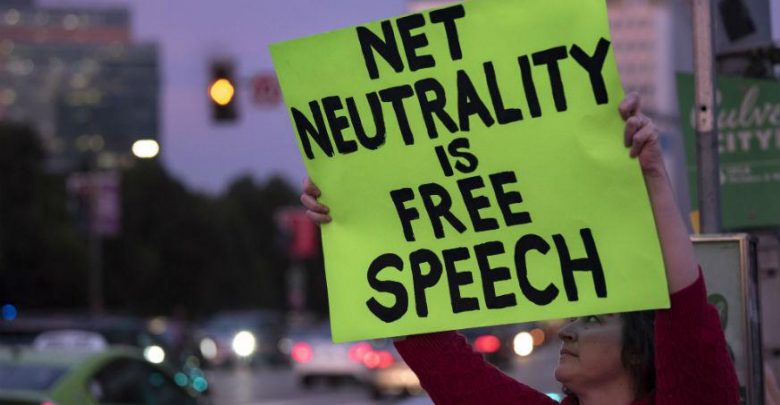News & Tips
Net Neutrality – What is it, and what will it mean for you?
Fight for your free(dom) online

Summary – The FCC has repealed net neutrality and this may mean drastic changes to how you use the internet in the future. Learn more about net neutrality and how you can fight to regain your online freedom.
The Federal Trade Commission (FCC) recently voted to repeal net neutrality rules that govern how internet service providers (ISPs) control data and content. What this means is that ISPs now are no longer required to provide unrestricted access to anyone on the web.
ISPs are now free to control the internet as they see fit, which can mean anything from restricting what sites you access to reading your private emails to your mother. Many have no clue that this change has occurred and worse still, they have no clue of the pending realities of the internet if net neutrality is not restored.
Table of Contents:
What Are the Pros and Cons of Net Neutrality?
There are arguments on both sides for and against net neutrality and they aren’t all tied to corporate profits. Let’s start by taking a quick look at a few of the top advantages of net neutrality.
Freedom of Speech -The #1 advantage of net neutrality is free speech. If ISPs can control which sites get priority, they will also be able to block or restrict access to sites they do not approve of. Imaging not being able to run your blog because it contained subversive opinions. That goes against the core concept of online freedom.
Startups are Protected – If you’re a small business or startup company online, you want to be able to have open access to the web. Without net neutrality, you will not have the same advantages as the big corporations without risking bankruptcy.
One Fee For Everything – If you use the internet for a wide variety of activities, you want the freedom to do so without having to pay extra.
No Throttling – Without net neutrality, you risk having your bandwidth reduced dramatically when you download too much – unless you want to pay extra for no throttling and trust us, you will pay big bucks for that service.
Contrary to popular belief, there are disadvantages to net neutrality. Here are a few of them:
Piracy – Online piracy is a big problem and there are many users that download music, videos, and programs illegally. Net neutrality actually helps to perpetuate online piracy.
The Internet is Clogged Up Unnecessarily – With a wide-open internet, you have users eating up provider bandwidth conducting a large variety of activities. Why should users have to plod through slower connections at peak times because a small percentage of users are using up 70% of the bandwidth?
Unrestricted Access to EVERYTHING – While unlimited access to the internet is considered great by some, it is a nightmare for others. Net neutrality allows you to access things such as porn, violent content, hate sites and more without restrictions.
Cost vs. Benefit is Too High for Basic Users – Presently, there are many internet users that pay way too much for their service compared to what they benefit from it. If you pay $60 to $100 a month for internet and just use it for basic web browsing and social media, then you are overpaying.
Why Net Neutrality Matters?
Many of you are probably wondering what the big deal is behind net neutrality. The internet has been around for decades now and things can’t really change that much, can they? Unfortunately, they can.
Think about your average monthly internet usage. What do you pay? Do you pay $29.99, $49.99, $99.99? For that flat fee, you get access to most anything the internet with the exception of premium services like Netflix, Hulu, and other paid services.
If you lived in a non-net neutral county, this is what you might expect to pay each month for internet access:
- Email (ISP) – $4.99
- Gmail – $4.99
- Skype – $6.99
- Twitter – $4.99
- Facebook – $9.99
- Instagram – $5.99
- Youtube – $9.99
- Netflix – 10.99
- Video Streaming – 5.99
- Mobile Apps Usage – $5.99
- Google – $4.99
- Bing – $4.99
- Yahoo – $4.99
- Internet Bandwidth – $1 per gig (Average $50 monthly)
See how quickly your bill can go up? In a non-net neutral country, you will pay for just about every internet service that you wish to use. By the way, this was residential charges
If you’re a business, expect to pay even more and if you’re a small business, expect to have the above fees plus a lot more for those to help you grow your business. Without net neutrality, the internet will simply be too expensive for many of us to use.
Oh, and one more thing. If net neutrality is revoked, your ISP will be able to track and monitor every single thing you do on the internet from your web searches down to reading your emails. Everything you do will be tracked and anything you do that violates and TOS or anti-piracy law can then be forwarded to the proper authorities. Using the internet will mean you consent to being tracked, and tracked you will be.
Will a VPN Help Get Around Net Neutrality Laws?
One of the best ways to retain your net neutrality is by using a virtual private network, or VPN. A VPN allows you to establish a secure tunnel to a server in a net neutral country and then use that server for your internet browsing. Read our summary of 2018 best VPN services.
Let’s say that YouTube starts charging $4.99 a month to US users but not to those in Switzerland. Connect to a Switzerland VPN and start using YouTube openly once more.
Next, VPN will actively mask your internet connection and prevent your ISP from tracking your activities while you’re connected to the VPN server. If your provider has a zero logs policy, then you can use the internet completely anonymous.
We should be completely honest in one aspect. If things get as bad as we mentioned earlier, there will be some aspects you won’t be able to get around. For example, if you have to pay a per gig fee to use the web, VPN won’t help with that. But it will help you get around geo-restricted content and keep your identity safe.
How to Fight For Net Neutrality?
While the FCC has all but ended net neutrality in the United States, the fight is far from over. There’s presently a resolution in the United States Senate to try and reestablish net neutrality. While it’s too early to tell how successful it will be, it is at least a step in the right direction.
You too can help to fight to reestablish net neutrality protections. First, start by contacting your Congressional representatives and urge them to support net neutrality. Let them know that people support a free internet.
Next, contact your state legislators and those in local government to support initiatives for net neutrality. Let them know why it is important and even how it can benefit them to support net neutrality. Always angle towards job creation and economic growth when supporting net neutrality and politicians are apt to listen.
Finally, support companies that support net neutrality. This is voting with your dollars. If you can use products and services from companies that support a free net, then do so whenever you can.
Together, we can show that a net neutral internet is in the best interest for everyone involved.

